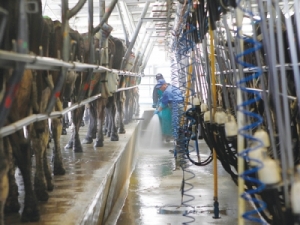Sharemilking as a career path is alive and well, says a new report on progression in the dairy industry.
The DairyNZ and Federated Farmers-resourced Dairy Progression Pathways report, undertaken by AgFirst, explores the latest trends and statistics relating to sharemilking and examines the issues created by milk price volatility.
Federated Farmers sharemilker farm owners' section chairperson Tony Wilding says the report shows opportunities for progression still exist but the career pathways have been changing and will continue to do so.
"While the number of traditional herd owning sharemilking (HOSM) agreements is slowly declining, the scale of them has increased and other options to invest in cows and land in equity ownership are continuing to emerge," says Wilding.
Federated Farmers sharemilkers' section chairperson Richard McIntyre agrees.
"Sharemilkers need to be better equipped to survive the climate of volatility through contracts that are flexible, allowing them to manage risk. As sharemilking contracts evolve, it is important that the risk remains relative to reward," says McIntyre.
"The report also highlights the need for improved due diligence prior to entering contracts. A number of failed sharemilking relationships can be traced back to a lack of due diligence at the start."
The Dairy Progression Pathways report shows that sharemilkers continue to make up 35% of the industry, but HOSM has declined to 17% from 25% in 1995. This may be due to milk price variation and the challenges it presents for sharemilkers and farm owners.
The number of farmers planning to purchase a dairy farm after sharemilking has also dropped to 47% from 70% 20 years ago.
DairyNZ's strategy and investment leader for people and business, Mark Paine, says opportunities for progression include making the most of alternative business structures and undertaking better due diligence before taking on a new contract.
"Refinement and improvement in these areas would lead to better outcomes for farm owners and sharemilkers," says Paine. "Successful business partnerships typically share business plans and have a common understanding of the goals and directions of each other's businesses."
He says those currently sharemilking should take heart.
"Our industry has many options for connecting with other farmers and rural professionals who are willing to share their knowledge and experience," says Mark. "Share what you want to achieve in the future and position yourself to strike when the opportunity arises. Others have succeeded and opportunities are out there."
To view the Dairy Progression Pathways report, go to www.dairynz.co.nz/pathways
Dairy Progression Pathways: key findings
• The percentage of sharemilking agreements in the industry remains relatively static at around 35 percent, but the percentage of HOSM has declined to 17 percent compared with 25 percent in 1995. Over the past five years, the number of HOSM positions has declined by 50 per year.
• The variation in milk price within seasons is causing problems with setting appropriate percentages for sharemilking agreements.
• Timing of entry and exit is a critical feature for sharemilkers in terms of maximising equity gain (or minimising loss).
• The percentage of sharemilkers intending to purchase a dairy farm at the conclusion of their sharemilking career has declined from 70 percent in 1996 to 55 percent in 2011, and to 47 percent in 2016. This will require a re-setting of goals for some sharemilkers.
• There is evidence of the market adapting to the milk price volatility, through an increase in variations to the standard clauses in sharemilking agreements.











